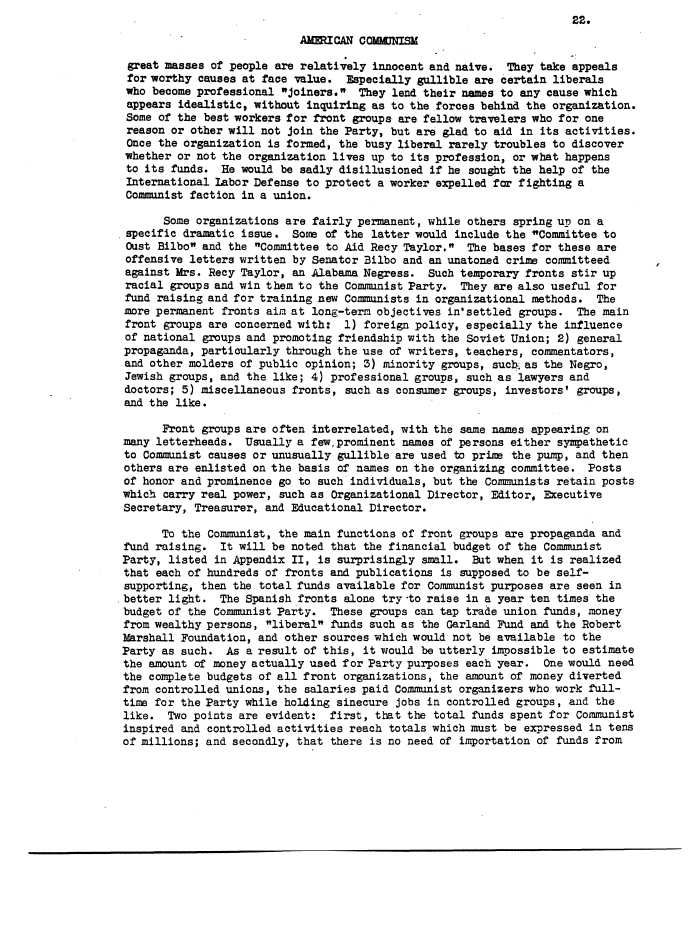 |
||||
 |
||||
| 22. AMERICAN COMMUNISM great masses of people are relatively innocent and naive. Ifcey take appeals for worthy causes at face value. Especially gullible are certain liberals who become professional "joiners." They lend their names to any cause which appears idealistic, without inquiring as to the forces behind the organization. Some of the best workers for front groups are fellow travelers who for one reason or other will not join the Party, but are glad to aid in its activities. Once the organization is formed, the busy liberal rarely troubles to discover whether or not the organization lives up to its profession, or what happens to its funds. He would be sadly disillusioned if he sought the help of the International Labor Defense to protect a worker expelled for fighting a Communist faction in a union. Some organizations are fairly permanent, while others spring up on a specific dramatic issue. Some of the latter would include the "Committee to Oust Bilbo" and the "Committee to Aid Recy Taylor," The bases for these are offensive letters written by Senator Bilbo and an unatoned crime committeed against Mrs. Recy Taylor, an Alabama Negress. Such temporary fronts stir up racial groups and win them to the Communist Party. They are also useful for fund raising and for training new Communists in organizational methods. The more permanent fronts aim at long-term objectives in'settled groups. The main front groups are concerned with: 1) foreign policy, especially the influence of national groups and promoting friendship with the Soviet Union; 2) general propaganda, particularly through the use of writers, teachers, commentators, and other molders of public opinion; 3) minority groups, suck as the Negro, Jewish groups, and the like; 4) professional groups, such as lawyers and doctors; 5) miscellaneous fronts, such as consumer groups, investors' groups, and the like. Front groups are often interrelated, with the same names appearing on many letterheads. Usually a few,prominent names of persons either sympathetic to Communist causes or unusually gullible are used to prime the pump, and then others are enlisted on the basis of names on the organizing committee. Posts of honor and prominence go to such individuals, but the Communists retain posts which carry real power, such as Organizational Director, Editor, Executive Secretary, Treasurer, and Educational Director. To the Communist, the main functions of front groups are propaganda and fund raising. It will be noted that the financial budget of the Communist Party, listed in Appendix II, is surprisingly small. But when it is realized that each of hundreds of fronts and publications is supposed to be self- supporting, then the total funds available for Communist purposes are seen in better light. The Spanish fronts alone try-to raise in a year ten times the budget of the Communist Party. These groups can tap trade union funds, money from wealthy persons, "liberal" funds such as the Garland Fund and the Robert Marshall Foundation, and other sources which would not be available to the Party as such. As a result of this, it would be utterly impossible to estimate the amount of money actually used for Party purposes each year. One would need the complete budgets of all front organizations, the amount of money diverted from controlled unions, the salaries paid Communist organizers who work full- time for the Party while holding sinecure jobs in controlled groups, and the like. Two points are evident: first, that the total funds spent for Communist inspired and controlled activities reach totals which must be expressed in tens of millions; and secondly, that there is no need of importation of funds from |